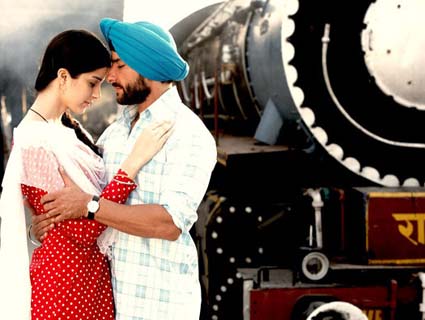
 |
 Love Aaj Kal captures some truths about frenetic, fractured - modern relationships, comparing them to the simpler - more direct passage of love and courtship in our parentsâ and grandparentsâ time. Although writer / director Imtiaz Ali has developed a likeable story with characters that are believable, the overall effect seems a little laboured, lacking the spontaneity and spark of the charming - Jab We Met (2007). From the outset however, it needs to be stressed that this is still an above average take on romance which does not underestimate the intelligence of the viewer. Love Aaj Kal captures some truths about frenetic, fractured - modern relationships, comparing them to the simpler - more direct passage of love and courtship in our parentsâ and grandparentsâ time. Although writer / director Imtiaz Ali has developed a likeable story with characters that are believable, the overall effect seems a little laboured, lacking the spontaneity and spark of the charming - Jab We Met (2007). From the outset however, it needs to be stressed that this is still an above average take on romance which does not underestimate the intelligence of the viewer.
As with Jab We Met the emphasis is on creating characters that we wish to know more about⊠Jai (Saif Ali Khan) and Meera (Deepika Padukone) are talented professionals who place greater value on their careers than their relationships. Their love affair is shown as a series of disjointed snapshots - a stream of parties, light-hearted banter, texting, phone-calls and ultimately - commitment-phobia culminating in a âbreak-up partyâ. You see, theyâre so cool about their relationship that breaking-up seems the easiest thing to do when careers pull them apart.
What separates this film from flimsier Bollywood romances is the all pervading feeling that these sophisticated, passionless young people have an inner life which has yet to be realised and disclosed. Imtiaz Ali once again hooks us in with character rather than peripherals such as action or plotting contrivances. We all know that investment in the characters is the essence of a good romance, so why then doesnât this film work?
I may be a bit of a traditionalist but the retrospectively narrated yesteryear romance - whilst making all the correct overtures, failed to provide the dil needed to set up a counterpoint to the tiresome banal of Jai and Meeraâs story. As with Jab We Met, the truth about love is to be found in the Punjabi âheartlandâ. In Love Aaj Kal the repository of that heart is to be found in the wonderful character of Veer Singh (Rishi Kapoor) with his gaze wistfully set on the nostalgia of bygone days. Yes, itâs probably a nod to Veer-Zaara (2004) as Imtiaz Aliâs Jab We Met used core ideas from Dilwale Dulhania Le Jayenge (1995).
The flashbacks are visually interesting - the narrow streets and back-lanes have an old, faded look which carry the splashes of colour offered by market stalls and festivities like gift wrapping on an antique. We enter the world of the Sikh community in Delhi and Calcutta but unfortunately, Veer and Harleenâs love story is told in clichĂ© style from beginning to end. All the traditional signposts are there such as pursuing the one you love on bicycle, being separated on a train platform or challenging the obstacles of arranged marriage and differences in status. Yet I hoped that Ali would somehow imbue this collection of ideas from the past with a revelation - a fresh appreciation, but it didnât happen within the flashback itself. It didnât happen in counterpoint either, because the old story only shed the slightest amount of meaning on the modern one - not enough to justify the huge amount of intercutting. Certainly courtship was simpler in the past; certainly lives were not sabotaged by career. Clearly Jai and Meera needed to wake up and listen to their hearts. But I wanted Veer Singh's flashbacks to be worthier of him; of what I know and love about old-time romance in film - its deep emotionality and grace.
The character development of modern girl - Meera was a little skewed. Initially she was too similar to Jai - almost a mirror image. When he fell in love with her, it was almost narcissism - perhaps this was intended but it became problematic. Deepika Padukone has not really been seen in an acting role of this magnitude and although she is quite competent, I felt that Saif Ali Khanâs performance was stronger and more assured. If her character had been compatible but markedly different - she might have had a little more artistic freedom to make it her own. As it was she was subsumed. When Meera becomes a force in the second part of the film, there seemed an absence of information about why she had changed. It wasnât a âbolt out of the blueâ but a slight âblind spotâ in the screenplay.
In terms of the picturization of songs Main Kya Hoon was a stand-out, showing a significant shift in Jaiâs perspective simply but powerfully. Thatâs not to say that the other songs didnât have their place. Chor Bazaari and Thoda Thoda Pyaar were beautifully celebratory - reflecting on the present and past respectively. Twist was a young manâs fantasy - brash, gaudy and a lot of fun. It was only Ajj Din Chadheya -a nostalgic lament - that was not really supported by its context because emotional impact seemed to missing from Veerâs story.
|
|||||||||||||||||||||
| Comments | Contact Us | Advertise | Terms of Service | Privacy Policy |